#if i try to tell myself this is unrealistic‚ I'm like‚ okay‚ let's assess the‚ the situation.
Text
I only have a will to live and aspirations or goals or any hopes for the future at all when nothing bad is happening and I'm in a really good mood
#if someone's not telling me every day that life doesn't and won't suck‚ coupled with personal anecdotes and statistics as proof‚ i want to#cease fo exist :/#like. who is supposed to keep my spirit? me???? lmao have you met her like.... she cannot be trusted#kata.txt#yes my exams are rapidly approaching and i can't see it as anything other than a doomsday situation. everything will go wrong and it'll be#humiliating and my friends will hate me and i won't get a job and my parents will kick me out :|#if i try to tell myself this is unrealistic‚ I'm like‚ okay‚ let's assess the‚ the situation.#what makes me think I'll pass the exams?#and then i find some reasons like the times my essays were praised and then i poke holes in those reasons like i didn't write the essays in#as much time as i'm gonna have at the Hungarian exam. so when it comes down to it‚ i won't be able to write a good essay#so nothing is certain so I'll fail and this'll be the first big Fail that'll have consequences#it's just all so. hm#nothing is real‚ there's not a single thing i know about myself‚ not one#and everything is a circle bc my thoughts keep returning to themselves (◡ _ ◡)#literally when crywank said sometimes i wish i was a goat. i don't want ''reason'' and ''feelings'' i want to sleep#preferably not wake up
4 notes
·
View notes
Note
Hi! I wanna run a marathon sometime this year, but I'm currently an unfit blob. Do you think it's possible or am I being unrealistic? I know nothing about running. Thanks!
Hi dear,
Sorry for the late reply, I hope you’re doing well.
Since, I don’t know what your current fitness level, this will be a general answer to your question.
The marathon is a difficult distance to master, no matter if you’re a bucket-list runner whose only goal is to cross the finish line, or if you’re a competitive runner on the hunt for a personal best. Even the most seasoned marathoners have no idea what their marathon times will be. Think about it-setting a finish time is a little like picking the winning lottery numbers because there are so many variables that can affect your performance: wind, rain, cold, heat, humidity, etc. Everything-from an ache in your calf to a hotspot on your foot to that cup of water you missed at the last fluid station-is heightened when you cover 26.2 miles on foot, but that’s part of the lure of the marathon. If it were easy, the accomplishment wouldn’t be as coveted.
It is definitely possible to run a marathon as long as you not scared of getting out of your comfort zone. If you stay in your comfort zone, you’re not going to do anything special. A comfort zone is a beautiful place, but nothing ever grows there. Running challenges, you.
The key to running a strong first marathon is to remember the three “P’s”: Preparedness, Patience and Perseverance.
Preparedness: Mental toughness
As I have discussed in previous posts the first step to any fitness goals is mental wellbeing. Those who’ve been following me for years know that I am a huge advocate of mental discipline. Most of us think that it is our body that will get the job done when it fact it is our mind. If you’re not right mentally you will never perform well physically. Mental Toughness is really what will get you to the finish line. The body achieves what the mind believes!

If you’re just getting into running, the first obstacle to overcome will be yourself. Getting through the first couple of months will be the most difficult because most people’s brains aren’t hardwired to have exercise every day. But sticking with it and exercising every day, after a couple of months your brain will be reprogrammed to expect you to get out and exercise every day. After that, it’s much easier to make the time and find motivation to go for a run or walk.
Having once weighted 220 pounds myself and suffered from class 2 obesity, I can attest that the first couple of months are horrible. You’ll probably see very little in the way of results and you’ll wonder why the hell you are bothering. You’ll get tired and you’ll get sick of it and you might lose your motivation. Just remember that it will get easier at the end of those first couple of months. While you’re establishing that routine, it’s really important to be kind to yourself. Don’t look at the scales, don’t worry about your times, don’t focus on running a marathon. Just focus on establishing a regular fitness routine. Commit to exercising every day regardless of what the outcome is over those first three months let’s say. That’s all! Just as you can’t start with a 250-lb deadlift, you can’t jump into training at an 8-minute mile. If you want to make it past a week of training you have to mentally and physically slow down.
While working on your mental toughness, also take this time to find yourself as a runner. Do you prefer training indoors or outdoors? It’s a lot easier to jump off a treadmill vs. running outdoors where giving up means you’ll still have to walk home. Are you a team player or a soloist? Find a running buddy who is just a little bit faster than you to keep you challenged, otherwise work on an awesome playlist to keep you pumped throughout your run. And find your solemate-stop by a running store to analyze your gait and find the proper sneaker (turns out the stability, cushioning shoe I splurged on would help ease shin splits for my overpronating feet).
To conclude here, I would also recommend that you start mastering the power of visualization. On several nights before going to bed, or first thing in the morning, visualize yourself crossing the finish line as the clock shows a new personal best. Before the 2004 Olympic Marathon Trials, where Wells placed seventh, she replayed positive mental images before falling asleep at night. “I knew the course we would be running, and I’d see myself out on it running well,” she says. “There’s a hill in the 25th mile, and I’d say to myself, ‘Okay, get up that hill, and then run strong to the finish.’”
Personally, I utilize self-talk and positive thinking. Self-talk is all about encouraging yourself, especially when things are starting to get tough. If I am hurting during a race, I tell myself that the other runners are probably hurting just as bad, if not more. When it comes to positive thinking, I think it is a good technique to use in running and in life. Even when things are not going well, there is a better day tomorrow. But you have to work for a better day, not just hope for one.

Mental limits will hinder you far behind physical limits will. Trust your training, trust your body.
Preparedness: Fitness Assessment
Before you start running you should start your new training cycle by assessing your current level of fitness. Many coaches have their runners complete a detailed self-assessment of their strengths and weaknesses as a runner, what types of runs they do and don’t enjoy, as well as previous PRs and reactions to training cycles. Look back at your training log to help complete your own self-assessment.
Preparedness: Training/Recovery
After that you’ve assessed your fitness level
choose a plan based on your fitness level
. Focused running is more important than long useless mileage. Longer endurance events need more aerobic work than shorter events. The key is to not overtrain. Make sure you are logging workouts to assess your volume week-by-week, month-by-month and year-by-year.
Your training plan should gradually build weekly mileage and the distance of the long runs. This slow-but-steady buildup allows you to get stronger and go longer, without getting hurt or burned out. Some days you’ll want to add more miles, but it’s best to stick to the plan.
Each week, you should do a long run to develop the endurance you’ll need to cover the race distance. On these runs, focus on covering the mileage for the day, and forget about pace. Take walk breaks to stay energized throughout.
There are a bunch of running schedules you can find online (like the ones from Hal Higdon, for example), but accept the fact that it’s OK to modify based on your ability and schedule, and set realistic, achievable goals in terms of mileage and pace. I have included one below.
Keep the training fun: mix it up with different length runs and a variety of speeds.
Build up gradually to a long run of more than 20 miles but less than 24, preferably over several months of a crescendo, adding two to three miles per week to the distance.
If you don’t have time to build up gradually, work in “brick” sessions where you run long on two sequential days so that the total is a marathon and your legs and mind know what it is like to run tired.
Avoid injury and illness by monitoring your body and addressing niggles when they are merely warning signs. Massage, ice, cross-training, a strong core, proper rest and recovery, shoes that match your running form and aren’t overly worn, a healthy diet, and a smart training schedule will all help in that quest.
Use ice baths to recover after longer runs and avoid massages before the big event-but feel free to make an appointment now for a few days after the race (a sports massage one or two days after the event could help speed up recovery).


Make Smart Adjustments to Your Training Plan The most difficult aspect of a bad workout is deciding how to proceed once you know it’s not your day. The two best options: slow the pace, and if that doesn’t work, stop the workout entirely. When you’re struggling this much to hit times for a workout, it’s better to regroup, put the workout behind you, and just move forward with the training. It’s important that you do not try to make up a workout the next day. This throws off the balance of the training program.
Note that when training for a marathon do not only focus on cardio. Don’t skimp on the strength training! It’s so important for injury prevention and goes a long way to help with both speed and endurance. Learning proper glute activation for any hills on the course will allow you to expend far less energy than if you were powering through with your calves, while lateral movements will help strengthen your hip and knee stabilizer muscles.
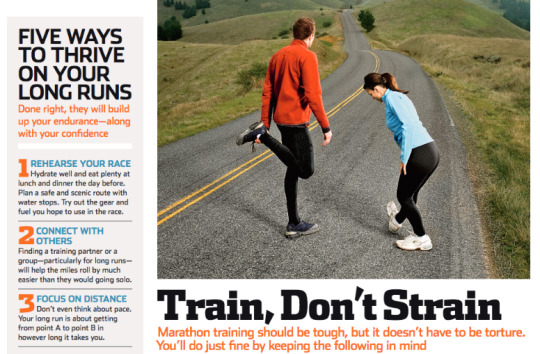
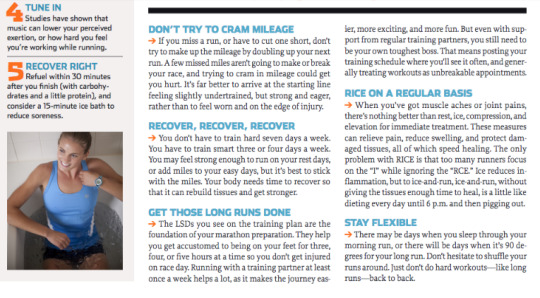
Preparedness: Nutrition/Eat well
In order to run your best, it’s important to have a balanced diet. About half your daily calories should come from carbohydrates, like whole grains, fruits, and vegetables. About a quarter of your calories should come from lean protein, like dairy, lean meats, beans, and legumes. The remainder should come from heart-healthy fats like olive oil and avocados. I would recommend that you read about the science of carb loading.
PRACTICE EATING ON THE RUN: You’ll need to refuel every 30 to 45 minutes during the race, so on your long runs, experiment with different brands and flavors of sports drinks, gels, and chews to find out which one sits best in your stomach. Be sure to try out the brand and flavor that will be offered at the race.
Plan out your hydration and nutrition strategy to get you comfortable through the entire distance. Find out what electrolyte drink they’ll have on the course and make sure it works for you. If not, find a solution, such as carrying your own or using salt tabs.
According to the latest science, the best way to fuel your body through a marathon is to drink enough fluid to keep your thirst consistently under control, and to consume at least 60 grams of carbohydrates per hour. There is more than one way to fulfill these recommendations. The specific way that’s best for you depends on how your body responds to nutrition intake while running.
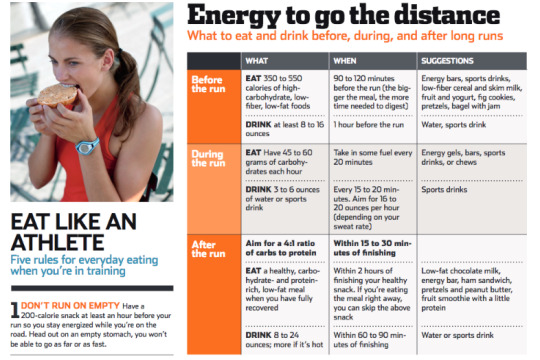
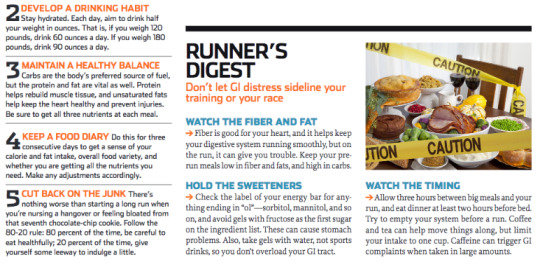
Preparedness: Stay committed to your goal
No matter how big or small your goal-whether it’s losing 5 or 50 pounds, walking a mile or running your first marathon-making change requires planning and S.M.A.R.T. goal setting.
Specific - target a specific area for improvement.
Measurable - quantify or at least suggest an indicator of progress.
Assignable - specify who will do it.
Realistic - state what results can realistically be achieved, given available resources.
Time-related - specify when the result(s) can be achieved.
Be SMART is an acronym championed by everyone from the University of Virginia to MIT to Fortune 500 companies for how to set actionable goals. Objectives should be Specific, Measurable, Accountable, Realistic and have a Timeframe. Specific goals will keep you accountable. “Lose weight” is too vague. “Lose 15 pounds in six months” gives you much more direction and allows you to have a way to measure your progress.
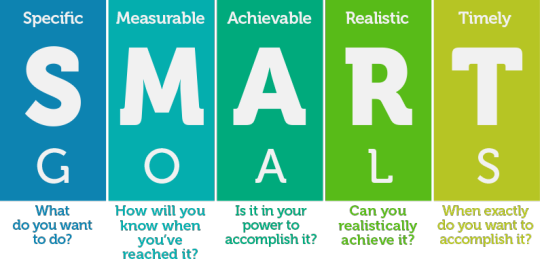
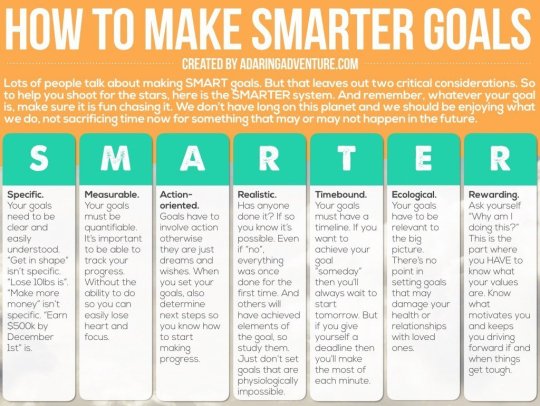
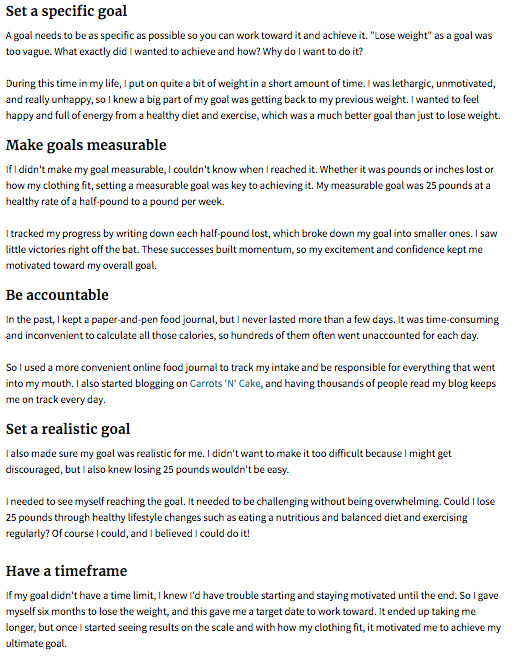
Be consistentOnce you’ve set your goal, you need to come up with a plan that emphasizes consistent effort. The idea of goal-setting is to challenge yourself each time you set out to work toward your larger goal. Setting up smaller, intermediate check points will help you track your progress and keep you motivated to work out on a regular basis. Remember: slow and steady wins the race. Small wins equate to big results. When people set out to run a marathon, they don’t immediately run 26.2 miles. They increase their mileage every week. Channel that same mentality as you set up a plan that allows you to realistically achieve your goal.
Patience:
Above everything else - nutrition, training programs, sneakers, etc. - being patient is the most important quality to possess. Running is an extremely humbling sport that breaks even the best runners. If you are patient and give yourself time to adjust to a routine and to build on the previous week’s work, then you will be able to accomplish your goals in due time.
Running your first marathon is all about conquering the distance, not beating the clock. It’s a way to establish your marathon fitness, which you can continue to build on and improve in future races.
Perseverance:
As a final word, I’d like to say here that running is not just about fitness and competition; it’s about changing our lives. Most of us run because it makes us feel significant, powerful, and in control, not just because we want to compete. When people who have never had a sense of accomplishment before suddenly gain it, it transforms every aspect of their lives. They become increasingly fearless. People always realize they can do more when they first do something at all. Confidence grows, and with it, so does vision.
I hope this was helpful.Cheers, Steph :)
272 notes
·
View notes
Note
I have a question that I hope is ok. I have had a suspicion that I might have some form of autism for quite a while now and when you reblog posts that say something along the line of just autism things like the one you just did I have to do a double take because I do all of those things + have them happen to me and am shocked when I see I'm not the only one who does these things especially the really abstract. I don't ever bring it up though in fear that people get upset that I'm "faking"
Oh man, mystery person, that’s pretty heavy!! I know the feeling, it took me a LONG time of self-examination to work out whether I might have autism, and I actually did have to deal with a less-than-optimal response when I tried to talk to someone about it. My doctor outright said ‘but you seem too smart for that’, like.. what the fuck?? So seriously, you need to be prepared to be PERSISTANT. Don’t lose confidence in your decision! Make sure you get to see an actual diagnosis, don’t let them lock you out of it based on dumb stereotypes. Cos seriously, general practitioners going ‘hey this person probably doesnt have this thing that’s completely out of my division, and I wont even let them talk to that division’.. thats just.. GOD I really get frustrated and scared thinking how much more messed up my life would be right now if I’d listened to him and not ever got help for my condition!
So my advice is basically.. even if you don’t want to ‘self-diagnose’, please do ‘self-diagnose’.You need to be abnormally prepared for this, you need to have a list of all your symptoms, you need to learn the terms and have reference to point to in the event of them denying you the ability to talk to an actual psychologist. And you need to be prepared for them even treating you like you cant be autistic if you were capable of doing this!You need to hand-hold your general practitioner through explaining what autism even is, and do whatever the fuck you can so you can get transferred over to someone who actually knows who they’re talking about.Oh and common ‘self-diagnosis’ type stuff can also help a lot in the meantime, because doing research on the subject can lead you to finding new coping methods, finding other people to ask about the subject, and just generally tiding you over until you’re able to get a professional diagnosis and (hopefully) access to things like therapy and local autism community groups.Also, just, in some countries medical care is way less accessable, so I know not eveyrone is even able to get a professional diagnosis at all.
Oh, and an important thing is that autism is a spectrum and there are many different symptoms you can have. it can even be hard to discover your own symptoms, you might find that they manifest in a weird way because you’ve been subconciously trying to hide them or using some form of unhealthy coping method for years. Going undiagnosed into your adult years is really like.. one of the primary causes for autism being REALLY disabling! Dear god my stage of treatment right now is just learning to untangle a bunch of bullshit I’ve done to myself over the years, and re-learn basic life skills and self confidence. I think if i’d been born into an environment with people who actually would have recognised it and cared about getting me help as a kid, i could have grown up without most of my anxiety issues!Another important fact is that adult autism is often co-morbid with anxiety issues, due to the circumstances of being left completely alone to deal with this thing for your entire life with no support. There’s also just a lot of ways certain anxiety disorders (as well as ADHD) can have overlapping symptoms with autism spectrum disorders. A lot of the ‘that feel when’ meme stuff can be relateable to all three of these otherwise quite different disorders. So I’d reccommend looking up info on ADHD, PTSD, generalized anxiety disorder, and related conditions too, and maybe seeing which disorder seems most similar to what you’re experiencing. And don’t be scared if it seems like you might have multiple of them! In real life being ‘all the tokens at once’ is VERY MUCH not ‘unrealistic’, man I really hate those people who’re like ‘hwaaa someone who’s black AND gay AND in a wheelchair? political correctness gone maaaad!’ Seriously, its very VERY possible to have more than one mental illness, especially ones that might have a knock-on effect causing another one. Going undiagnosed and untreated for ANYTHING can lead to developing anxiety and depression, but going undiagnosed for a social disability makes it especially likely to get specifically social anxiety.oh, and randomly for an example I happen to also have prosopagnosia, which means I can’t tell the difference between people’s faces. I literally cannot recognise my best friend if she changes her hairstyle or glasses. This is kinda Double Hell combined with autism, cos its already a challenge for me to judge people’s emotions, lol!
Oh man I’m kinda going offtopic and just rambling every damn fact I know, but I’m just hoping maybe something will be helpful??I really am not an expert on autism, I dont even know any good informative blogs to link you to. I’m just a regular person who happens to have the condition, and I don’t know how to give good advice when i’m still quite often suffering from denial and self hate myself...But I dunno, I just hope it could help to hear my personal experience, and know that you’re not alone.Though now I’m worrying maybe this post is a little intimidating so it might make you feel worse?? Seriously, this is just a worst case scenario thing, hopefully your doctor won’t be as casually gatekeepy as mine was. And I mean, he seemed like a good man who wasnt exactly rude about it and wasnt doing it on purpose. If anything that worries me more, tho, cos he was just politely saying ‘haha no you’re wrong’ to a patient, about a subject he wasnt remotely qualified in, and wouldnt have ever considered reccommending me to a professional if i hadnt kept nagging him about it and come back with a bunch of research and stuff. It felt SO damn cathartic to get that ‘YES, AUTISM’ in the end! Shame I couldnt show it to him and I probably would have had my entire healthcare cut forever if I boasted XDAlso, I was lucky that I had my charity support worker to help me through the stress of the assessment interviews. I hope you have at least one person who’d be able to be there for you and believe you, in times like these. Or, even if you’re like me and you dont’ have any family and stuff, I hope you end up meeting a surprisingly awesome governent worker lady who wears a cool hat and helps you out. Seriously, Amber, you’re a godsend!
So umm.. yeah.. i am REALLY sleep deprived and I am not good at words but i hope some of this helped?? I hope you’re okay, anon!And honestly, reading ‘lol relateable jokes’ type posts on people’s blogs was how I first started suspecting I was autistic, too. I’d grown up buried in so many stereotypes of mentally ill people, I never thought I was one of them until I actually got to read blogs from their perspective. Joke posts obviously aren’t a substitute for a diagnosis, but I think they kinda serve a valuable role in the self acceptance process, yknow? Thank you, joke posts!
#aaaaaa tired bunni is bad at helpiiiiing#if any of my followers are smarter and more informed and generally awesome then please help#anon i really hope your day goes well and you're alright#and when i get back from having a sleep i will be able to talk to you again if you need it!#A Nonny Mouse#ask
8 notes
·
View notes